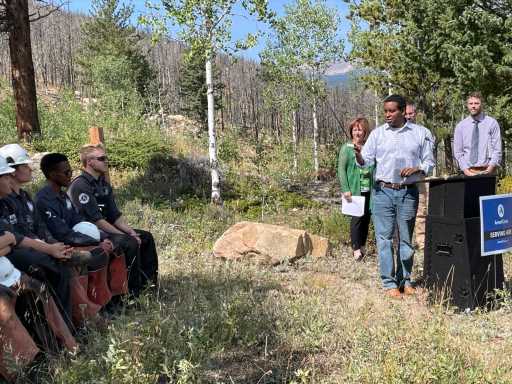Marcus Luscher’s 30-acre property northeast of Nederland was still smoking when he bought it about five years ago, after the Cold Spring Fire swept through.
As his dog, Local, gnawed a leftover piece of charred wood late Friday morning, Luscher pointed out where the fire had been.
“It burned that hill and it burned that hill, and it got my neighbor’s house,” Luscher said.
He fears more wildfires in the coming years as climate change brings hotter, drier summers. He also gave thanks for the small group of AmeriCorps volunteers who’ve cleared dead and fallen trees, shrubs and other flammable plants.
The newly announced Colorado Climate Corps will double down on that work across Colorado, drawing crew members from the larger AmeriCorps pool.
On Friday, Democratic U.S. Rep. Joe Neguse and Lt. Gov. Dianne Primavera celebrated with Luscher at a news conference on his property, with both of the politicians noting that worsening climate change underscores the urgency for this kind of work.
The Colorado Climate Corps will launch in January, according to Scott Segerstrom, executive director of the Colorado Youth Corps Association. Over the course of 2022, about 240 people will go to 55 counties across the state to try to prevent and blunt wildfires — as well as the deadly floods and mudslides that can follow, with a special eye toward the areas where people and nature collide.
“It’s our urgent crisis,” Segerstrom said. “Every day that goes by is another day that the risk increases.”
The Colorado Climate Corps isn’t entirely a new concept, said Brigid McRaith, CEO of the Mile High Youth Corps. It’s a throwback (albeit a more inclusive and diverse one) to the Civilian Conservation Corps of the 1930s, which built Red Rocks Ampitheatre.
The reimagined Corps is also essentially a pilot program, Neguse said. In Congress, he’ll use Colorado’s efforts to argue for a nationwide expansion. After a joint nine-hour markup session Thursday, three House committees agreed to include $50 billion in President Joe Biden’s Build Back Better Act, Neguse said.
If the act is signed into law, about $10 billion would go toward workers and jobs to launch a 21st Century Climate Conservation Corps, Neguse said. And $40 billion would fund prevention and preparedness projects across federal lands.
“It would fund projects just like this across the west,” he said, gesturing to the small crew and what they’d done on Luscher’s land. “The need is just so incredibly large.”
But Democrats hold the thinnest possible majority in the Senate, and West Virginia Democratic Sen. Joe Manchin has expressed concerns about Biden’s $3.5 trillion package, saying he’ll support as little as $1 trillion, Axios reported.
The conservation work is not only necessary, it’s also satisfying, said Katey Meehan, who was the land conservation leader on Luscher’s property. The 23-year-old Denver native said she grew up delivering papers but now she looks across mountainsides, spotting pines, conifers and fallen trees that could pose risks to homes.
“It gives me purpose, makes me realize that there’s so much more than suburbia,” Meehan said. “And this is the most direct way I can make an impact with my community.”
Source: Read Full Article





